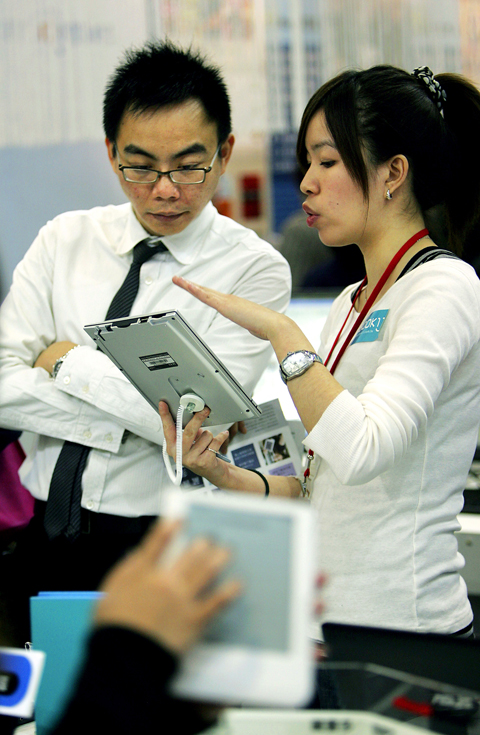Despite an aggressive push by Taiwanese makers and publishers in the electronic book world, an industry tracker said the market may only mature in another two years.
The e-book market has begun to make waves, but the market is in a mess as e-reader formats and user interfaces are not standardized, Topology Research Institute (拓墣產業研究所) said in a report on Wednesday.
“It is an uphill task for companies to turn a profit in the short term,” the researcher said.

PHOTO: WALLY SANTANA, AP
To gain a foothold in the emerging Chinese-language e-book market, players must find a synergy with their peers in China and introduce uniform standards. Hardware and software must also be better integrated to appeal to book readers, it said.
It will take another one to two years for the market to restructure and mature, the report said.
DEBUT
BenQ Corp (明基) debuted its first e-reader on Tuesday, as well as a digital content database “eBook Taiwan” (伊博數位書屋).
The 15cm, 250g “nReader” carries a price tag of NT$8,990 (US$272) and was featured at the 18th annual Taipei Book Exhibition, which finishes at the Taipei World Trade Center today.
BenQ has collaborated with a Japanese partner for technology licensing for eBook Taiwan, which boasts some 10,000 titles.
Currently, digital content is only in e-reader format, but BenQ said it would launch formats so that the content could be read on notebooks and mobile phones in the future.
BenQ expects 100,000 e-readers will be sold in Taiwan this year, and the firm is aiming to seize more than half of the market, BenQ vice president Jerry Wang (王文璨) told reporters during the launch of the e-reader.
The bulk of nReader sales would be in China, where the company plans to introduce a third-generation model next month. The firm is cooperating with Chinese telecoms operators and is targeting selling 300,000 units this year, Wang said.
L&B
Meanwhile, digital database platform provider Asiaworld Digital Technology Co (碩亞數碼科技) has also moved into the digital book world by launching an e-reader system called L&B (Library & Book) on Wednesday.
The L&B platform is targeted at library operators, offering a digital archive of almost 100,000 titles, Chris Huang (黃識恩) said.
So far, the company has sold the L&B system and its content to more than 90 educational institutions and it is looking to work with e-reader manufacturers, such as BenQ and Asustek Computer Inc (華碩), to further promote its solution, he said.
Also showcasing an e-reader at the book fair was Yuan-Liou Publishing Co (遠流出版).
Scheduled to debut in April, the “Jin Yong Reader” comes with all 36 martial arts titles written by renowned Hong Kong-based author Louis Cha (查良鏞) — better known as Jin Yong (金庸) — in electronic format.
Designed by Koobe Inc, the 15cm model will cost about NT$12,000 with the 36 titles pre-loaded, a company executive said.

Quanta Computer Inc (廣達) chairman Barry Lam (林百里) is expected to share his views about the artificial intelligence (AI) industry’s prospects during his speech at the company’s 37th anniversary ceremony, as AI servers have become a new growth engine for the equipment manufacturing service provider. Lam’s speech is much anticipated, as Quanta has risen as one of the world’s major AI server suppliers. The company reported a 30 percent year-on-year growth in consolidated revenue to NT$1.41 trillion (US$43.35 billion) last year, thanks to fast-growing demand for servers, especially those with AI capabilities. The company told investors in November last year that

Intel Corp has named Tasha Chuang (莊蓓瑜) to lead Intel Taiwan in a bid to reinforce relations between the company and its Taiwanese partners. The appointment of Chuang as general manager for Intel Taiwan takes effect on Thursday, the firm said in a statement yesterday. Chuang is to lead her team in Taiwan to pursue product development and sales growth in an effort to reinforce the company’s ties with its partners and clients, Intel said. Chuang was previously in charge of managing Intel’s ties with leading Taiwanese PC brand Asustek Computer Inc (華碩), which included helping Asustek strengthen its global businesses, the company

Taiwanese suppliers to Taiwan Semiconductor Manufacturing Co. (TSMC, 台積電) are expected to follow the contract chipmaker’s step to invest in the US, but their relocation may be seven to eight years away, Minister of Economic Affairs J.W. Kuo (郭智輝) said yesterday. When asked by opposition Chinese Nationalist Party (KMT) Legislator Niu Hsu-ting (牛煦庭) in the legislature about growing concerns that TSMC’s huge investments in the US will prompt its suppliers to follow suit, Kuo said based on the chipmaker’s current limited production volume, it is unlikely to lead its supply chain to go there for now. “Unless TSMC completes its planned six

Power supply and electronic components maker Delta Electronics Inc (台達電) yesterday said it plans to ship its new 1 megawatt charging systems for electric trucks and buses in the first half of next year at the earliest. The new charging piles, which deliver up to 1 megawatt of charging power, are designed for heavy-duty electric vehicles, and support a maximum current of 1,500 amperes and output of 1,250 volts, Delta said in a news release. “If everything goes smoothly, we could begin shipping those new charging systems as early as in the first half of next year,” a company official said. The new